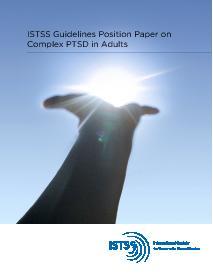ISTSS Guidelines Position Paper on Complex PTSD in Adults
For the past two decades, there has been substantial debate about whether there are qualitatively different symptom profiles that can develop from different experiences of traumatic events. It has been proposed that more complex symptom profiles, called “complex PTSD,” can emerge from events that involve multiple, chronic or repeated types of traumas that are of an interpersonal nature and from which escape is difficult or impossible such as childhood abuse, domestic violence, genocide campaigns and being a prisoner of war (Herman, 1992).
Symptoms that emerge from these types of traumas have typically included difficulties in emotion regulation, self-concept and relational capacities in addition to those of PTSD such as re-experiencing of the trauma, avoidance of trauma related stimuli and hyperarousal (Ford, 2015). Critiques about the utility of the complex PTSD construct have pointed to lack of clarity in its formulation and consequently lack of persuasive evidence regarding the phenomenon (de Jongh et al., 2016; Landy et al., 2015; Resick et al., 2012). A second debate has been whether individuals presenting with complex PTSD, in any of its formulations, would benefit from modified forms of established PTSD interventions or alternative forms of intervention (Cloitre, 2015; de Jongh et al., 2016).
Geachte bezoeker,
De informatie die u nu opvraagt, kan door psychotraumanet niet aan u worden getoond. Dit kan verschillende redenen hebben,
waarvan (bescherming van het) auteursrecht de meeste voorkomende is. Wanneer het mogelijk is om u door te verwijzen naar de bron
van deze informatie, dan ziet u hier onder een link naar die plek.
Als er geen link staat, kunt u contact opnemen met de bibliotheek,
die u verder op weg kan helpen.
Met vriendelijke groet,
Het psychotraumanet-team.
7 pages | Oakbrook Terrace : The International Society for Traumatic Stress Studies (ISTSS)
http://www.istss.org/getattachment/Treating-Trauma/New-ISTSS-Prevention-and-Treatment-Guidelines/ISTSS_CPTSD-Position-Paper-(Adults)_FNL.pdf.aspx


